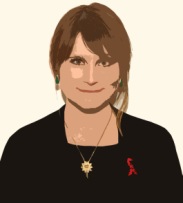LGBT young people are saying #WeExist in sex education

In early 2015 we wrote to David Cameron ahead of the General Election to ask his party to support statutory and LGBT inclusive Sex and Relationships Education (SRE). The response we received from our now re-elected Prime Minister was telling. Despite the topic of the original letter, the response had no mention of the terms LGBT, gay, trans* or same-sex relationship. Even the term SRE was removed – he referred to PSHE only. It was a sex-less response.
For many LGBT young people this reply is probably not surprising. They are used to feeling ignored and marginalised, especially when it comes to talking about sex in school. But do we really want to hear young people tell us things like: ‘my school provided literally no information which was relevant to me. They ignored and continue to ignore all LGBT issues…’ (NAT’s Boys who like boys survey, 2014). We have to wonder how the young person who said this would have felt reading David Cameron’s letter; a letter which failed to acknowledge them.
This is just part of the reason why we have launched #WeExist, the campaign for LGBT inclusive sex education. It’s about the right of LGBT young people to be provided with information about sex, relationships and all the things that come with these, in a way that is relevant to them.
The experience of an LGBT young person in an SRE class can be a very lonely one. Assumptions are often made about the body, gender, who people are attracted to, who people want to have sex with, the types of sex people might want to have. It leaves people feeling marginalised and means that they do not have vital information to support them with moving into relationships. In the METRO Youth Chances survey of LGBTQ young people (2014) less than one in five reported that their school provided useful preparation for happy and healthy sex and relationships.
Young LGBT people are more likely to experience poor sexual and mental health than their non-LGBT peers, yet SRE is not currently required to include information on same sex relationships or gender-variance. For example, our survey of young men attracted to other men found that three quarters had not received any information about same sex relationships in school (2014). HIV diagnoses amongst men aged 16-24 have doubled in the past 10 years yet we are not talking to them about safer sex in a way that is relevant to them.
When it comes to SRE the truth is that schools have a lot of freedom and this isn’t something the Government has a desire to change. Recent announcements that all schools are to make the move to academy status will mean that the number of schools that have to teach SRE will decrease over time to zero.
In theory, new academy schools will have the freedom to do exciting things to meet the individual needs of their students. In reality – there is no requirement and limited resource for them to teach a complex and difficult subject, or to teach it well, or to acknowledge that some of their students might be LGBT.
If we are to tackle some of the major health inequalities affecting LGBT young people, we have to start at school.
Find out more about what the Government can do to ensure that we have LGBT inclusive SRE.
Find out more about how to get involved with #WeExist.
NAT is completely independent, so we can challenge injustice wherever we see it – always led by the issue not where the money is. But we can only do this with your help. Please donate now to support our work campaigning for the rights of people living with HIV and agruing for policy change to ensure less HIV transmission.


